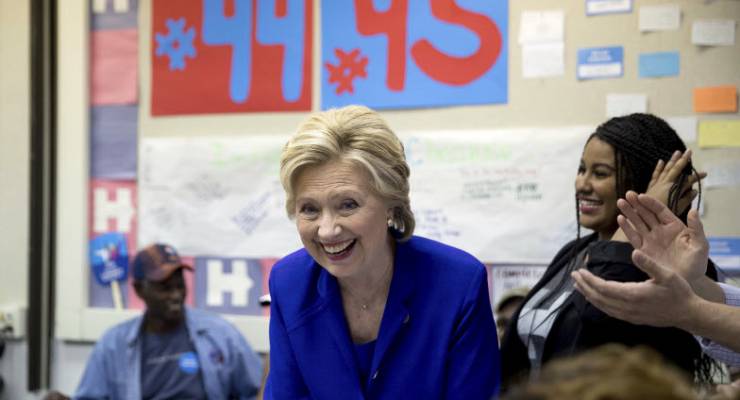
If one were to take recent mainstream media reports at face value, one might be excused for thinking that the US presidential race is now neck and neck or that Donald Trump is now leading Hillary Clinton. It is true that Trump squeaked ahead of Clinton in one poll and that, by contrast, some media outlets have noted that national averages still put Clinton in the lead.
However, both observations are misleading. There is no doubt that the race for the presidency is tightening, and this trend started before the FBI decided to effectively intervene in the electoral process by again raising the spectre of unofficial emails from Clinton’s private server. While the email saga has not helped the Clinton campaign, it is also not clear that it has had a significant impact on the tightening race.
It was always likely that, when voters were required to make up their minds between “the unthinkable” and “the unpalatable”, they would ultimately revert to previous voting patterns, which appears to largely be what they have done. That helps explain why Trump’s chances of winning have doubled over the last two weeks, and not just over the last few days.
So, less than a week out from the election, a fair section of the media has gone into something of a frenzy over the competing narratives of Trump being in the lead in one poll as opposed to Clinton retaining a national lead. Both narratives forget, however, that the US presidential electoral system is based on an electoral college, in which blocs of votes are allocated on a state-by-state basis in which the winner takes all state votes. A marginal win in a state delivers all of that state’s votes.
This is to say, a presidential candidate might win a majority of the popular vote but, unless they win enough states with enough electoral college votes, they won’t be elected as president. And some states count more than others, given that electoral college votes are allocated on an approximate basis of proportional representation — or states with larger populations having more college votes and smaller states having fewer votes.
In this environment, all states are important, but some states are more important than others. Florida, for example, was the single state that tipped the 2000 election and handed national victory to George W. Bush by just a few hundred votes. Setting aside questions of irregularities in that state vote, Trump must win Florida if he is to have a real chance at being elected president.
By contrast, Clinton can theoretically lose Florida but still win the presidency, given she retains sufficient support in other states that have larger blocs of electoral college votes. On the latest state by state polling, if the election were held today (or maybe yesterday), Clinton would lose Florida but win the election with 296 votes to Trump’s 240.
It is also important to note that as voting intentions become more clear, Florida is favoring Trump, but by less than 1%, which is well within the margin of error. One projection of voting trends has Trump winning Florida by just 0.1%, which, if this is somewhere near correct, means we won’t know the outcome of the Florida vote by election night. That may, or may not, matter to the overall outcome.
In terms of chances of winning the presidency, while Trump has closed the gap, the odds are still a little more than two to one against him (71% versus 29%). Having said that, North Carolina, Nevada, New Hampshire and North Carolina are currently just favoring Clinton and could potentially go to Trump. If these states go to Trump and Clinton also, if more unexpectedly, loses Pennsylvania, then she will be in real trouble.
Who ends up in the White House matters, of course, to more than just Americans, hence the global rolling commentary. What a victory by either candidate will mean will be the subject of another discussion.
*Damien Kingsbury is professor of international Politics at Deakin University








Crikey is committed to hosting lively discussions. Help us keep the conversation useful, interesting and welcoming. We aim to publish comments quickly in the interest of promoting robust conversation, but we’re a small team and we deploy filters to protect against legal risk. Occasionally your comment may be held up while we review, but we’re working as fast as we can to keep the conversation rolling.
The Crikey comment section is members-only content. Please subscribe to leave a comment.
The Crikey comment section is members-only content. Please login to leave a comment.